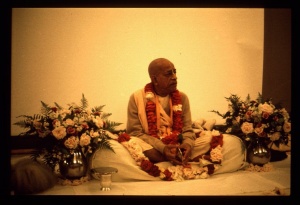CC Antya 6.230: Difference between revisions
No edit summary |
(Vanibot #0054 edit - transform synonyms into clickable links, which search similar occurrences) |
||
| Line 17: | Line 17: | ||
<div class="synonyms"> | <div class="synonyms"> | ||
''prabhura āge'' | ''[//vanipedia.org/wiki/Special:VaniSearch?s=prabhura&tab=syno_o&ds=1 prabhura] [//vanipedia.org/wiki/Special:VaniSearch?s=āge&tab=syno_o&ds=1 āge]'' — in front of Śrī Caitanya Mahāprabhu; ''[//vanipedia.org/wiki/Special:VaniSearch?s=kathā&tab=syno_o&ds=1 kathā]-[//vanipedia.org/wiki/Special:VaniSearch?s=mātra&tab=syno_o&ds=1 mātra]'' — any speaking; ''[//vanipedia.org/wiki/Special:VaniSearch?s=nā&tab=syno_o&ds=1 nā] [//vanipedia.org/wiki/Special:VaniSearch?s=kahe&tab=syno_o&ds=1 kahe]'' — does not say; ''[//vanipedia.org/wiki/Special:VaniSearch?s=raghunātha&tab=syno_o&ds=1 raghunātha]'' — Raghunātha dāsa; ''[//vanipedia.org/wiki/Special:VaniSearch?s=svarūpa&tab=syno_o&ds=1 svarūpa]-[//vanipedia.org/wiki/Special:VaniSearch?s=govinda&tab=syno_o&ds=1 govinda]-[//vanipedia.org/wiki/Special:VaniSearch?s=dvārā&tab=syno_o&ds=1 dvārā]'' — through Govinda and Svarūpa Dāmodara Gosvāmī; ''[//vanipedia.org/wiki/Special:VaniSearch?s=kahāya&tab=syno_o&ds=1 kahāya]'' — he informs; ''[//vanipedia.org/wiki/Special:VaniSearch?s=nija&tab=syno_o&ds=1 nija]-[//vanipedia.org/wiki/Special:VaniSearch?s=bāt&tab=syno_o&ds=1 bāt]'' — his intention. | ||
</div> | </div> | ||
Latest revision as of 20:48, 19 February 2024
Śrī Caitanya-caritāmṛta - Antya-līlā - Chapter 6: The Meeting of Śrī Caitanya Mahāprabhu and Raghunatha dasa Gosvāmī

His Divine Grace
A.C. Bhaktivedanta Swami Prabhupada
A.C. Bhaktivedanta Swami Prabhupada
TEXT 230
- prabhura āge kathā-mātra nā kahe raghunātha
- svarūpa-govinda-dvārā kahāya nija-bāt
SYNONYMS
prabhura āge — in front of Śrī Caitanya Mahāprabhu; kathā-mātra — any speaking; nā kahe — does not say; raghunātha — Raghunātha dāsa; svarūpa-govinda-dvārā — through Govinda and Svarūpa Dāmodara Gosvāmī; kahāya — he informs; nija-bāt — his intention.
TRANSLATION
Raghunātha dāsa never even spoke a word before the Lord. Instead, he informed the Lord of his desires through Svarūpa Dāmodara Gosvāmī and Govinda.